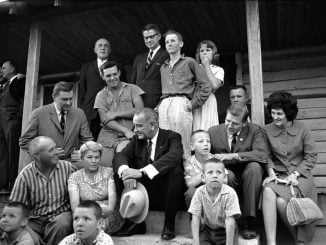
In his memoir “An Easy Burden,” American Civil Rights icon Andrew Young tells the story of a man racing up to him with a Confederate flag flying from his pickup truck while he was out campaigning for Congress in the Atlanta suburbs. His account stresses a moment of fear, understandable since it had only been a few years since the assassination of his friend Martin Luther King, Jr. and Robert Kennedy. The individual merely was excited to meet the former King assistant and was there to pledge his support for his campaign. Young had to admit, while certainly justified by past circumstances, he carried his own biases.
Atlanta, as it is sometimes still described today, was then the epicenter of “the New South.” It represented an eclectic mix of racial backgrounds and traditions making some positive strides on race, especially in regards to listening and a broadening tolerance. Young was the first black citizen since Reconstruction to be elected to Congress from Georgia in 1972. Now 85, he often points to the importance of making progress particularly in regards to substance over symbols, including those linked to the Confederacy. As a former Christian minister, he understands that there are problems with using symbols as distractions or scapegoats for deeper issues or deficiencies within the human heart. Like a good doctor, Young’s main interest is in treating the root causes of a disease, instead of merely the symptoms.
Unfortunately, in the age of identity politics and elevating ideology above all else, those types of reasonable dialogues are diminishing. One wonders if the disturbing scenes from Charlottesville, Virginia this weekend will have any impact on bringing people together? Perhaps very briefly in some communities, but adherence to identity politics often propagated by large segments of the left is exacerbating national fragmentation akin to what Hoover Institution fellow Victor Davis Hanson has called a “Cold Civil War.”
One must only look to Durham on Monday evening, where a mob toppled a Confederate statue, to see the wrong kind of response to Charlottesville. The vandalism of monuments, perhaps perpetuated by some on different political spectrums is repeating itself across the country.
After decades of championing special victim statuses that classify Americans by groups, who can now be shocked that dangerous identity politics is gaining some traction among a small minority of white Americans? Identity politics and ideology begets new competing factions, instead of our e pluribus unum, or “out of many, one” motto. That is why after Charlottesville, it remains prudent to denounce all forms of racism and violence, which certainly includes an abhorrent and un-American white supremacist ideology.
But using tragedies as a means to a political end, in this specific case to primarily blame conservatives and perhaps even more shockingly Christians, only fuels the finger-pointing narrative so prevalent in our broken politics today. Of course, Christianity is the radical inverse of supremacy ideologies and conservatism said Russell Kirk, “is the negation” of ideological servitude.
Texas Senator Ted Cruz and Florida Senator Marco Rubio were two of the first to denounce the hate and terrorism taking place at Charlottesville by white supremacist groups, but almost immediately New York Times reporter Eric Lipton unfairly chastised them for “posturing for 2020” presidential runs. Of course, ideology above all else in the eyes of this reporter, who like many, is quick to turn a tragic situation into his own political posturing or blame game.
“In a world where change is inevitable and continuous, the need to achieve that change without violence is essential for survival,” declared Young. Whether that violence comes from elements of the left or right is ultimately less important than our shared history and destiny as a people. Unfortunately, our politics and much of culture no longer recognizes a broad tolerance and continues to spiral out of control. It’s up to millions of good Americans to change that.
Ray Nothstine is a member of the North State Journal’s editorial board, separate from the news staff. Unlike other newspapers, the North State Journal does not publish unsigned editorials; the author or authors of every editorial, letter, op-ed, and column is prominently displayed. To submit a letter or op-ed, see our submission guidelines.



